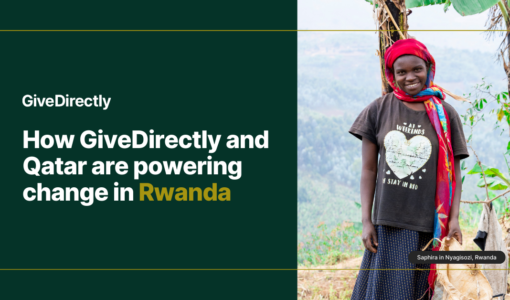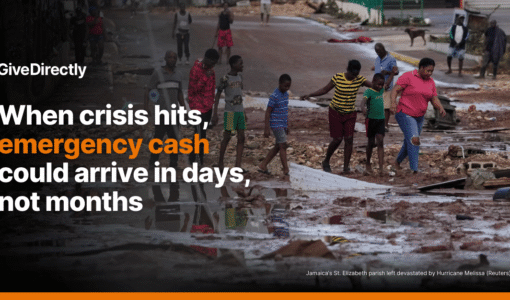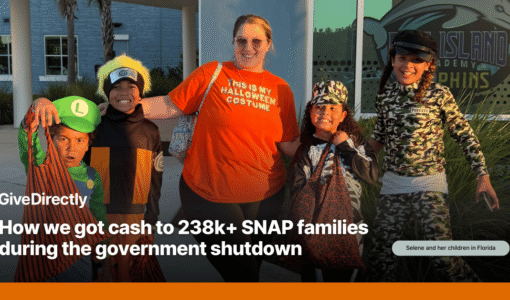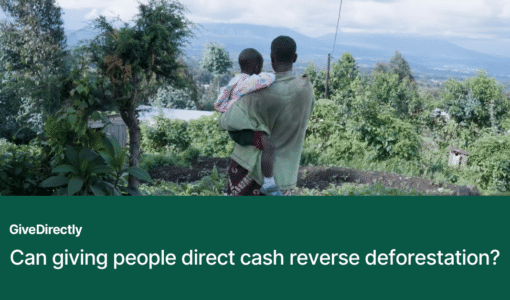
May 19, 2025
By Mona Hanna and Miriam Laker-Oketta
Bill Gates recently pledged to give away nearly all his $200 billion in wealth by 2045, aspiring to have no mom, child or baby die from a preventable cause. As two physicians — one in Michigan, one in Uganda — we know accomplishing such a bold goal will require a powerful but overlooked tool: giving mothers cash.
Not advice. Not training. Just money — with no strings attached.
We came to this conclusion from opposite sides of the world. One of us (Hanna) is a Michigan State University pediatrician spearheading the first community-wide program in the United States to “prescribe” cash to expectant mothers and newborns. The other (Laker-Oketta) is a Ugandan global health researcher and physician testing how large, unconditional transfers to the world’s poorest mothers improve health outcomes.
Our reasoning is not ideological; it’s clinical. After years spent treating the effects of poverty with medicine alone, we grew tired of writing prescriptions that couldn’t fix the root cause. What good is an iron supplement when a mother can’t afford food to go with it? Why fund prenatal clinics if women have no money for transportation? Why tout the benefits of breastfeeding when a mom has to return to work just days after giving birth?
In Michigan and Malawi, a basic truth applies: Poverty is a health crisis, and money is the missing medicine.
Started in one of the nation’s poorest cities — Flint, Michigan — and now in eight counties, Rx Kids prescribes $1,500 during mid-pregnancy and $500 per month for six months to a year for every pregnant woman, regardless of income. The program receives public and private funding. With 100 percent of eligible participants enrolled, families report fewer missed meals, more stable housing and fewer symptoms of postpartum depression. Early results show more prenatal care, healthier births and fewer NICU stays and child welfare cases.
In Africa, the numbers from GiveDirectly’s privately funded research are even more striking. In Kenya, a one-time $1,000 cash transfer to households cut mortality of children younger than 5 in half. In Rwanda, a similar program reduced child mortality by 70 percent and nearly doubled the vaccination rate — outperforming a traditional nutrition and sanitation program in the same area. The cash allows mothers to afford clinics, food, safe deliveries — or simply rest in late pregnancy, instead of risking their health with hard labor. Here, cash helps more children survive to their first or fifth birthdays.
The science is clear. Dozens of studies show that cash improves health, from better birth weights and nutrition to higher vaccination rates and lower maternal stress. It’s also more cost-effective than other widely scaled aid programs focused on advice or training.
These results do not mean cash can replace direct health interventions but rather is an efficient way to multiply the effectiveness of clinics, vaccines and health education. Improving technologies can allow us to send cash to expectant mothers at vulnerable moments fully remotely — from an isolated village in Mozambique to Michigan’s rural Upper Peninsula.
Skeptics worry that recipients might waste the money, but those fears are unfounded. The data consistently show that families spend this money wisely: on food, shelter, baby supplies and health care. In Michigan, the most common purchases are for infant essentials such as diapers and cribs in addition to rent and utilities. In East Africa, mothers report buying food, paying school fees, or investing in farmland. These are not luxuries; they’re lifelines.
Some question sustainability. But evidence shows long-lasting gains — better health, reduced poverty — even a decade later. Cash also boosts local economies and supports global goals such as disease prevention and vaccination coverage.
So, why hasn’t cash become a cornerstone of maternal and child health policy?
Aid agencies often build complex, top-down programs that reflect their priorities rather than those of the families they hope to support. If we want to save babies with dignity, we must trust mothers with cash.
Another barrier is political. Cash transfers are sometimes dismissed as handouts. But cash for new moms is earning bipartisan support — including from pro-life Republicans who see it as a smart way to support mothers, reduce infant mortality and revitalize local economies.
We’re not arguing that cash alone can fix health systems. But without addressing the economic deprivation at the heart of so many poor outcomes, other investments are less effective. Giving cash doesn’t mean doing less — it’s a catalyst, making every other intervention more likely to succeed.
If even a fraction of Gates’s $200 billion pledge went toward direct cash for mothers, we could rewrite the future of maternal and child health — globally.
Mona Hanna, the founder and director of Rx Kids, is a pediatrician and associate dean of public health at Michigan State University College of Human Medicine in Flint, Michigan. Miriam Laker-Oketta, senior research adviser to GiveDirectly, is a medical doctor and researcher.



